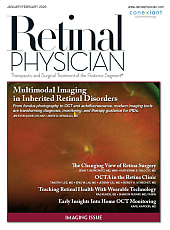
Riad Sherif, MD, is the chief executive officer and director of Oculis, a global biopharmaceutical company. Dr. Sherif is a physician and holds an MBA from IMD Business School in Lausanne, Switzerland.
Ophthalmology Management: Oculis reported positive data from its phase 2 ACUITY trial of OCS-05 in acute optic neuritis. Can you give us an overview?
Riad Sherif, MD: Privosegtor (OCS-05) is a novel peptidomimetic small molecule candidate with the potential to become a first-in-class neuroprotective therapy in acute optic neuritis and beyond. The phase 2 ACUITY trial was a randomized, double-masked, placebo-controlled, multi-center trial designed to evaluate the safety and efficacy of privosegtor (OCS-05) administered intravenously once-daily for 5 days in patients with acute optic neuritis also receiving steroid vs steroid alone. In total, 36 patients were randomized.
Positive results from the trial demonstrated that privosegtor (OCS-05) achieved its primary endpoint of cardiac safety with no difference between privosegtor (OCS-05) and placebo and all events were mild and transient. Furthermore, in the safety monitoring, we detected less MS relapses as compared with patients treated with steroid alone 10.5% vs 35.7%.
In addition, it achieved key efficacy-based endpoints showing neuroprotective retina anatomical preservation and visual function improvement in patients with acute optic neuritis. These efficacy endpoints include changes in retinal thickness, wherein privosegtor (OCS-05) was shown to preserve ganglion cell inner plexiform layer (GCIPL) thickness and retinal nerve fiber layer (RNFL) thickness, as well as visual function, specifically low-contrast visual acuity, compared to steroid alone. I am very excited about the positive safety and efficacy results from the ACUITY trial, which represent a significant milestone in bringing the first potential neuroprotective treatment in ophthalmology and neuro-ophthalmology. These results were consistent with effects observed in multiple in vivo models (glaucoma, acute optic neuritis, multiple sclerosis animal models) of neuroinflammation.
OM: Can you discuss the significance this neuroprotective treatment will have for patients?
RS: The acute inflammatory process of acute optic neuritis leads to loss of myelin covering the optic nerve and the axons. Without the myelin sheath protecting the axons, neurons become fragile and prone to death, which can lead to permanent visual impairment. While the high-dose steroids used today can shorten the acute inflammatory process, there remains an unmet medical need for therapies that preserve neurons and axons from dying and thereby preserve vision. The ACUITY trial’s positive results highlight a neuroprotective treatment effect from privosegtor (OCS-05), preserving retinal ganglion cells (GCIPL thickness) and the axons (RNFL thickness) and its ability to improve visual function in patients suffering from acute optic neuritis. From a clinical perspective, acute optic neuritis is a rare condition often seen in multiple sclerosis, as a typical MS relapse, that can lead to permanent visual impairment. It is also a frequent initial manifestation of multiple sclerosis. Even if some patients regain high contrast vision after an acute episode, low contrast vision, color vision, and visual fields remain impaired. They may have difficulty reading properly, working on their computer, or driving.
OM: What is the next step?
RS: We will complete a full analysis of the dataset ahead of discussions with health authorities about the registrational study requirements for the orphan condition, acute optic neuritis.
Notably, the ACUITY results suggest broader opportunities for OCS-05 in multiple neurodegenerative diseases in ophthalmology, neuro-ophthalmology, and neurology. We will assess additional potential indications for privosegtor (OCS-05) where its potentially first-in-class neuroprotective properties could benefit patients.
OM: Can a neuroprotective treatment potentially have wide applicability in
neuro-ophthalmic indications?
RS: From a neuro-ophthalmological perspective, it is encouraging to see that this drug may have the ability to prevent neuronal and axonal loss. Neurodegeneration is a hallmark of many ophthalmological diseases, including glaucoma and diabetic retinopathy. These findings open the door to several potential indications for privosegtor (OCS-05). In neurology, it is equally encouraging to see the potential to prevent neurodegeneration in patients. For example, these results offer hope for patients suffering from multiple sclerosis. OM








